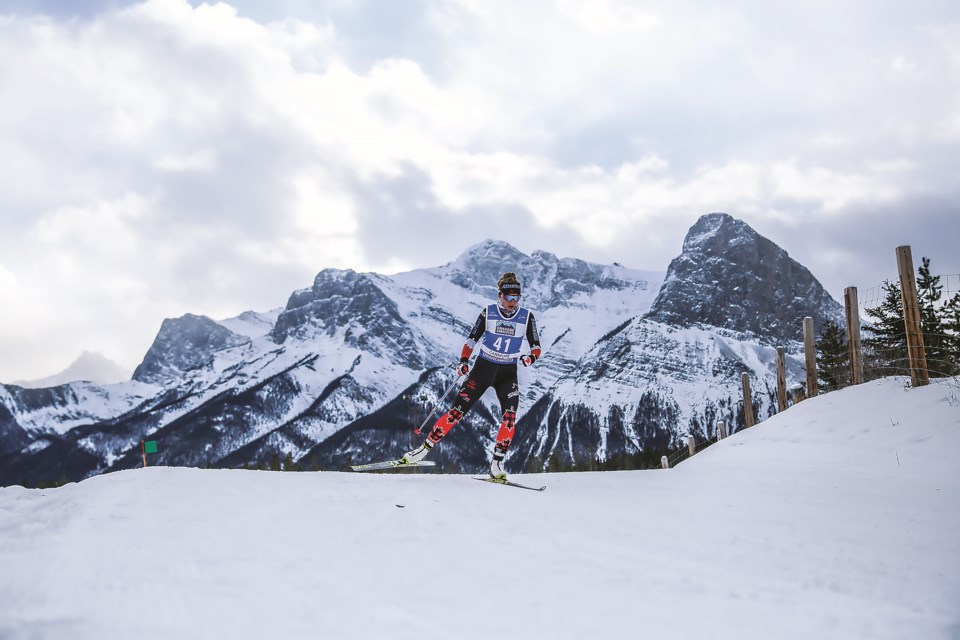CANMORE – Another Paralympics, lots of medals, a stockpile of pressure and emerging as one of Canada’s must-watch athletes – again – Natalie Wilkie’s second multi-medal Games is moving her closer to the title of Canada’s most decorated female winter Paralympian.
At only 21 years old and fresh off winning gold twice, silver and bronze at the Beijing 2022 Winter Paralympic Games, Wilkie was Canada’s youngest medallist – a feat she also achieved four years ago in PyeongChang at age 17.
“I was pretty nervous coming into these Games,” said Wilkie. “I set the bar pretty high in PyeongChang and I was wondering how I would be able to top that.
“I think I definitely topped it: two gold, one silver, one bronze. I’m pretty proud of how my Games went.”
Now a seven-time Paralympic medallist, the product of Salmon Arm, B.C. has already cemented a spot in the history books. It’s just a matter of how far she will go with it.
Wilkie is in a strong position of passing Para alpine skier Lana Spreeman, a 13-time medallist (one gold, six silver, six bronze), as the country’s most decorated female Paralympian, should the 21-year-old skier continue down this path. And all signs are pointing to it.
“I’m still young in the sport and I’m even younger than when Brian [McKeever] started. He asked me if I’m going to become the next Brian, and I said, ‘I don’t know if I’m going to be skiing until I’m 42, but you never know what happens,’” Wilkie said. “Yeah, 21, and a seven-time Paralympic medallist is pretty surreal.”
Wilkie, along with Para Nordic Ski teammate Mark Arendz, won the most medals for Canada in Beijing with four each.
Canada's Para Nordic Ski team won 14 medals (six gold, two silver, six bronze) in Beijing.
It started on Day 3 of the Paralympics, and some less-than-spectacular results in biathlon were drumming in Wilkie’s head. Missing seven shots in the biathlon sprint on opening day and finishing second last isn’t how any athlete wants to start the biggest competition of their career.
The 15km standing cross-country race was a fresh start. Wilkie got her head together and won gold in the race, and teammates Brittany Hudak won bronze and Emily Young was fifth to cap off remarkable results for the Canadian women.
“I knew the last couple days leading up to that, even in the morning of the biathlon race I was mentally disorganized and just my energy was just all over the place,” said Wilkie. “I had a good chat with my coach [Robin McKeever] and he just told me you have to get yourself together, basically. … I was worried coming into the 15km and I knew I had to be super organized and prepared and just be ready to do my best. Mentally, I was really in a good space that day and it paid off.”
Sydney Peterson of the United States snagged silver.
Peterson was the early leader, but faded around the 5km mark in the classic. Wilkie chased down the American and took over the lead at the 5.9km mark and never looked back. She finished at a time of 48:04.8.
In women’s standing sprint, the “best moment of the Games” happened for Wilkie. Just like the big climax scene from a movie, the short race came down to two competitors: Wilkie and world champion sprinter, Vilde Nilsen of Norway.
In the final 100 metres, the two champions went head-to-head with the Canadian turning on the nitro and pulling ahead in the moments.
“Honestly, I wasn’t sure I’d win until about the last five metres, but it was a pretty awesome push to the finish,” said Wilkie. “Vilde has been pretty dominant in the sport of so long and the victory was especially sweet knowing I was coming in as the underdog.”
Paralympic Champion once again! Natalie Wilkie claims another gold, this time in the women's standing sprint 🥇 @NordiqCanada pic.twitter.com/BzIZxVqsSo
— Canadian Paralympic Committee (@CDNParalympics) March 9, 2022
In women’s standing middle distance, Wilkie tumbled on the last downhill portion of the final lap, but managed to quickly get back up to her feet and swiftly won silver at a time of 41:45.3 – more two seconds faster than bronze medallist Iryna Bui of Ukraine.
The snow on the course deteriorated quickly in the mild conditions and she slipped out on an icy fast patch in the middle of that downhill.
“My first thought was, ‘wow, I just lost a medal. This sucks,’” said Wilkie. “I got up as fast as she could and skied as hard as she could to the line and crossed my fingers maybe get on the podium was sure I wouldn't be in first.”
On the final day of the Games, Canada’s 4X2.5km mixed relay team consisting of Collin Cameron, Young, Arendz and Wilkie, won bronze, crossing the line at a time of 27.00.6.
"It's been an amazing experience, it’s been an awesome team," said Wilkie. "I was only able to join four years ago, but in those four years this team has pretty much become my social life, my friends, my family, and I'm pretty stoked on how awesome of a Paralympics we had collectively as a team and I'm sad that there’s going to be a few changes this year, but I'm really excited I was a part of Brian's last Paralympics and Emily's as well. But I’m really excited to see where this team goes in the next few years as well."


